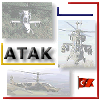|
|
Following an Undersecretariat for the Defense Industry (SSM) executive board meeting on Monday, Ecevit announced the elimination of Boeing and the German-French consortium, Eurocopter, competing with its Tiger model. The prime minister cited their failure in technical specifications as the reason for their elimination, causing disappointment in both companies. Ecevit disclosed that the United States' Bell, Italy's Agusta and Russia's Kamov, competing jointly with Israel's Israeli Aircraft Industries (IAI), have been short-listed and will be required to submit more details on technical specifications. The SSM executive board is headed by Prime Minister Ecevit and includes Gen. Kivrikoglu and Defense Minister Sabahattin Cakmakoglu. One of the main reasons cited for the elimination of Boeing was because although its Apache is considered to the most advanced helicopter offered by the foreign companies competing in the project, it is very expensive to maintain. Additionally, Turkey is not familiar with the Apache, thus making its joint production costly. Bell increased its chances of winning the attack helicopter project by using to its advantage its sale of Cobras and Super Cobras to Turkey in the 1990s. For traditionalists within the Turkish Armed Forces (TSK) Turkey would enjoy the benefits of having an attack helicopter to be co-produced with a company that has already sold similar, though less advanced, aircraft. This would be cost effective. Offering Turkey a King Cobra model to be developed jointly with Turkey, Bell has also seized on the advantage of proposing the transfer of approximately 10 Super Cobras prior to co-production in order to meet the immediate requirement of the Land Forces Command (KKK). Some press reports suggested that one of the reasons for Boeing's elimination was its refusal to transfer technology on its Longbow radar. However, sources close to the project have denied those reports, bringing to mind that the company had already been negotiating details on the co-production of the radar with local Aselsan, a subcontractor in the project. Turkey's Land Aviation School is also said to have been upset about Boeing's elimination. Sending its deputy prime minister, Ilya Klebanov, to Ankara just prior to Turkey's announcement on the project was a factor in short-listing the Russian Kamov, said defense industry sources. Russia is engaged in a bitter struggle with Turkey for influence in the Caucasus region, noted the sources, who do not rule out the possibility of a secret deal between Ankara and Moscow on cooperation in the region in return for Russia winning the project. The Russian copter's air frame is cheaper, while the Israeli avionics to be installed are expensive, thus balancing the cost and making it the cheapest of the remaining three competitors in the project. Russia has also pledged to transfer unlimited technology while offering third-country sales. Many analysts also draw attention to close Turkish-Israeli relations, thus increasing the chance of the Russian helicopter in Turkey's selection of a winner. Due to its size and cost the attack helicopter project has been highly politicized, leading to various rumors and fabricated information while witnessing a large struggle among lobbyists representing the competing companies. The models of the three companies remaining in the competition are the United States' Bell Helicopter-Textron (AH-1Z King Cobra), Italy's Agusta (A129-I) and Russia's Kamov competing jointly with Israel's IAI (KA-50/52-Erdogan). The project foresees the co-production of 50 attack helicopters in the first batch. A total of 145 attack helicopters are planned to be co-produced; however, industrialists are talking about a final production of only about 90 instead of 145 aircraft due to a re-evaluation of the threat concept by the Turkish military once the first batch of 50 is completed in late 2002. This has been cited as one of the reasons for Turkey to make an agreement for only the first batch of 50 aircraft instead for all 145. Turkey's delay in the selection of a winner has further delayed the project.
(Turkish Daily News, Lale Sariibrahimoglu) |

 Turkish Chief of General Staff Gen. Huseyin Kivrikoglu is said to have thrown his weight behind a decision to eliminate one of the two U.S. companies competing in Turkey's $4 billion attack helicopter project while short-listing the other in one of the century's major projects. Reflecting the traditional approach to Turkey's defense procurement strategy, Kivrikoglu is said to have favored Bell's King Cobra, which was short-listed with other two companies' helicopters in Monday's decision.
Turkish Chief of General Staff Gen. Huseyin Kivrikoglu is said to have thrown his weight behind a decision to eliminate one of the two U.S. companies competing in Turkey's $4 billion attack helicopter project while short-listing the other in one of the century's major projects. Reflecting the traditional approach to Turkey's defense procurement strategy, Kivrikoglu is said to have favored Bell's King Cobra, which was short-listed with other two companies' helicopters in Monday's decision.